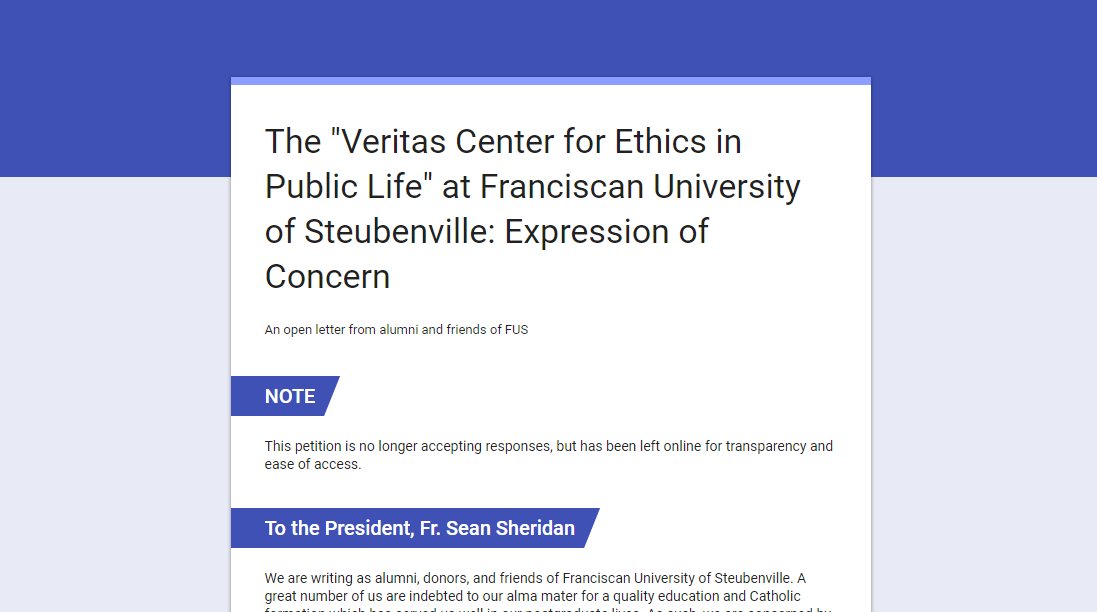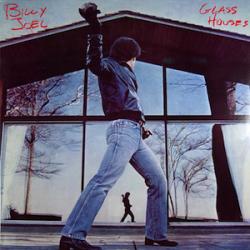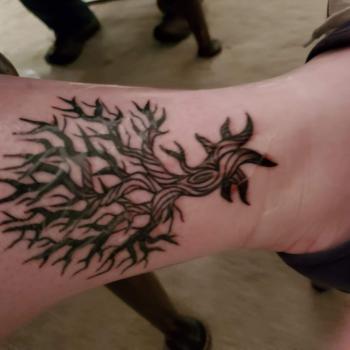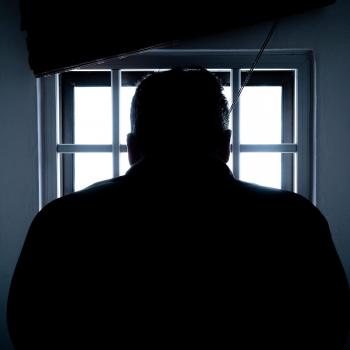
I’ve been recently privileged to grow close to Franciscan University alumna Theresa Williams. She wrote a stunning guest contribution for The Shoeless Banshee a few weeks ago, and we have bonded over our mutual love of our Faith and of writing. A few days ago, Theresa informed me that she and her co-authors of the “Concerned Alumnae Letter regarding the Veritas Center for Ethics in Public Life” (which I signed and endorsed) were writing a statement to clarify recent controversy over the aims and intentions behind their letter, and I told her I’d be more than happy to host their statement here.
-Marie Kopp
On April 18, 2018, we authored an open letter voicing our concern as alumnae with some of the writings coming out of the Veritas Center for Ethics in Public Life at Franciscan University of Steubenville.
This letter was intended to highlight some of the works by Profs. Anne Hendershott and Stephen M. Krason which we find problematic (for different reasons, as will be discussed below), as well as to draw attention to overt rejection of Vatican II teaching by another associate of the Veritas Center, Prof. Timothy J. Williams, on social media . Since the circulation of this letter, there has been confusion over what exactly we find problematic in the cited materials by Hendershott and Krason. It seems that some nuance in meaning has been lost since the initial reaction. There is concern that we are condemning the full scholarly bodies of works by these authors, or even accusing them of willfully contradicting explicit portions of Church teaching. This is not the case.
We are concerned with specific attitudes that they present and the environment that the University is fostering by officially hosting these writings.
Profs. Hendershott and Krason do make legitimate points in each of the cited articles. Profs. Kason’s and Hendershott’s advocacy for due process for the accused is laudable, and some of their concerns (notably that Title IX, as written, is lacking in protections for these individuals) are legitimate and need to be discussed in the wider academic community. In “Progressive Politicians Two-Faced Over Due Process,” Prof. Hendershott also rightly highlights the hypocrisy from some individuals on the extreme ideological left in the implementation of sexual misconduct procedures. We readily recognize that, in much of the popular discourse around #metoo, nuance is flattened, snap judgments are treated as evidence-based convictions, and little to no space is given for genuine inquiries.
However, this is a two-way street, and there are problematic themes interlaced with these professors’ valid arguments, most notably, that when alleged perpetrators are defended without careful attention simultaneously paid to alleged victims, it is the far more vulnerable party, the alleged victims (who already risk so much to speak up), who are beaten down.
Professor Krason’s work shows an inconsistency with Church teaching on upholding the dignity of the human person. To succinctly demonstrate this, we would like to quote alumnus Paul Druce (with permission), from a public thread in the Frannies Talk to Each Other Facebook group discussing Prof. Krason’s article “What Sexual Harassment Crisis?”:
“Krason refers to female victims with: ‘Were their careers more important to them than sexual virtue? Can’t they truly be viewed, at least to some degree, as cooperators with wrongdoing?’ However, ‘Rape can be committed by the use of physical or moral force (grave fear, including reverential fear, fraud and deceit); likewise by a sin committed with a woman who has not the use of reason (one who is insane or intoxicated)’ (Moral Theology, Jone and Adelman, 1953, §226).”
Any sort of mental or emotional coercion used to solicit sexual favors decreases the culpability of the victim in her/his sexual abuse/harassment to nil. Prof. Krason appears to deny this reality, and that denial does violate Catholic teaching.
Druce expands on another of Krason’s works (emphasis added):
“In ‘Street Harassment: Another Misdirected Cause?’, Krason does his level best to minimize, obfuscate, and ignore the problem of women being subjected to sexual harassment in public (which is a violation of their dignity), going so far as to accuse women, collectively and individually, of being responsible for their objectification and denigration by men… Now, the objectification and denigration as expressed by catcalls and other crude comments or forms of public harassment is an offense against the dignity of the woman in question; to sympathize with and normalize it is, as the letter notes, to ‘avow attitudes which are contrary to upholding the Church’s teachings on the innate dignity of the human person.’”
Any action in which the person is looked upon, acted upon, or used as an object rather than a subject obfuscates the dignity of each person, and this is in direct opposition to Catholic teaching.
A second, albeit less troubling, aspect of Prof. Krason’s writings has to do with its scholarly quality. Although his peer-reviewed academic work attests to a career of excellent scholarship, his writings in Crisis Magazine which are cited in our open letter lack cohesive arguments and contain a plethora of logical fallacies (see Emily C.A. Synder’s response to “What Sexual Harassment Crisis?”). The arguments contained in these are neither thoughtful nor well reasoned, and their presence on the Veritas website is not a flattering example of what Franciscan University has to offer students in terms of training in critical thinking.
Similarly, another nuance of our critique of the Veritas writings by Prof. Hendershott is our concern that they may feed the current atmosphere, becoming increasingly prominent in American Catholic circles, which conflates amoral or morally ambiguous issues which are culturally controversial (e.g., the removal of Confederate monuments) with issues of Catholic orthodoxy.
This is particularly apparent in “First they Came for the Confederacy,” in which Prof. Hendershott draws a rather bizarre parallel between the removal of Confederate monuments and the secularization of Catholic Universities. The legacy of the Confederacy is not only extremely contentious but is also a painful reminder for many African Americans of the historical racist practices within this nation, some of which continue to this day. Additionally, many of the Confederate monuments now being removed were erected in retaliation to desegregation in the mid-20th century and have little in the way of genuine ties to Southern U.S. heritage.
Disregard for this understanding reflects not a genuine conservative viewpoint but a continued silencing of the perspective of the marginalized within this country. To be clear, we are not saying that Hendershott herself is advocating white supremacist positions, merely that persons already subject to that dangerous ideology could very easily read her writings and find their racism affirmed.
As discussed above, the professional bodies of work of Profs. Krason, Hendershott, and Williams are wide and not entirely problematic. Former students of Prof. Krason attest to the fact that he is a meticulous and thoughtful man and scholar—it is exactly for this reason that we are concerned by his recent writings and attitudes towards women (in and out of his classroom—see the syllabus excerpt in Jenn Morson’s article), sexual assault, and the complicity of victims in their attacks. It is for these reasons that we are concerned with the current leadership of the Veritas Center.
We are not calling for the dismissal of Profs. Hendershott, Krason, or Williams, or even the dissolution of their organization.
Rather, we ask for charity, growth, and closer complicity with Catholic teaching rather than political ideologies, either right or left. We would like Franciscan University of Steubenville to carefully consider their association with the writings of the Veritas Center, so that there will be no further confusion on either the apolitical nature of Catholic Social Teaching or the University’s stance toward victims of sexual misconduct.
We emailed the letter with 300 signatures (3/4 alumni or current students) to University president Fr. Sean Sheridan, the board of trustees, and the advisory board on Thursday, April 26, with a hard copy following to Fr. Sheridan himself. We patiently and prayerfully await a public response from our beloved alma mater.
Sincerely,
Claire Gilligan (08)
Anne Marie (Sohler) Snoddy (09)
Theresa (Bey) Williams (07)












